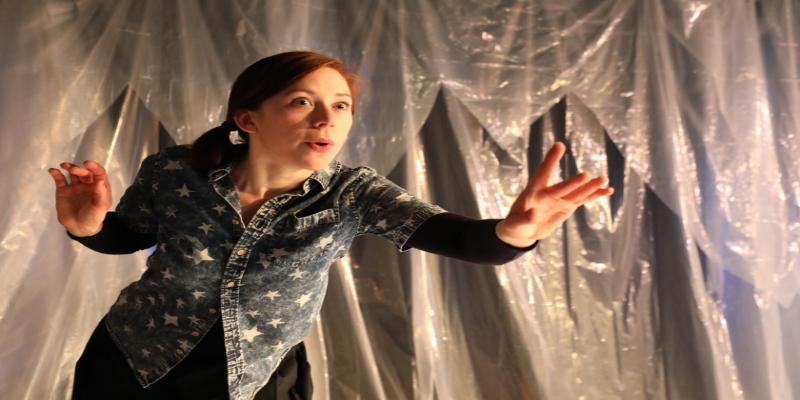| Code | MATPP |
|---|---|
| Duration | 1 Year Full-time; 2 Years Part-time |
| Teaching Mode | Full-time, Part-Time |
| Qualifications | MA |
| NFQ Level | Level 9 |
| Start Date | Not offered until 2027/2028 academic year. |
Course Outline
Our MA in Theatre & Performative Practices at University College Cork is designed to produce flexible, empowered theatre artists who understand performance as a form of embodied intelligence and a way of engaging with our troubled and beautiful world. This MA provides a challenging and supported space for graduates and professional practitioners who are interested in making and thinking about innovative, cutting-edge work. We conceive theatre and performance as vibrant world-making and world-changing strategies for engagement and change through practice and theory. If you choose this MA programme you will learn to follow your instincts and explore your unique creativity, within a rigorous critical context and research environment.
With a focus on experimentation, collaboration, and composition, we offer you a unique opportunity to develop your own voice in a dynamic, practice and research-based, interdisciplinary learning environment. We exist at a crucial juncture in the history of theatre and performance practice in Ireland and worldwide; the cost of living crisis and war in Ukraine, the migrant and climate emergencies, and the movements of #BlackLivesMatter and #MeToo all contributing to lively debate and controversy about the culture and nature of performance, film, and theatre.
Our MA in Theatre & Performative Practices makes space for performance as an essential tool for social and political change and our graduates emerge ready to invigorate the cultural life of Ireland, Europe, and beyond.
Programme Details
All students take modules worth 35 core credits, 10 elective credits, and a final project worth 45 credits. The core modules form the central shared programme of critically rigorous and creatively adventurous theatre and performative practice.
Part I - Semesters 1 & 2 (45 credits)
- DR6001 Advancing Theatre & Performative Practices (Semester 2) (15 Credits)
- DR6002 Composition Theatre & Performative Practices (Semester 1) (15 Credits)
- DR6003 The Business of Theatre & Performative Events (Semester 1) (5 Credits)
Plus choose 10 credits:
- DR6026 Advanced Theatre Practice (Semester 1) (10 credits)
- DR6025 Special Studies in Applied Theatre (Semester 1) (10 credits)
Modules from other departments in the College of Arts, Celtic Studies & Social Sciences (CACSSS) where enrolment is available and approval of the Programme Director is obtained. (It is strongly recommended that students select a module in Semester 1 for workload balance reasons. Final timetabling may preclude participation in conflicting modules.)
Part II - Semester 3 (45 credits)
- DR6004 Practice Research Project 1: Theatre & Performative Production (45 credits) or
- DR6005 Practice Research Project 2: Theatre & Performative Process (45 credits) or
- DR6006 Research Dissertation in Theatre & Performative Practices (45 credits)
Part-time option
The part-time option can be taken over two years with coursework completed in Year 1 (45 Credits) and a thesis completed in Year 2 (45 Credits).
Academic Programme Catalogue
See the Academic Programme Catalogue where you can search for the complete and up-to-date content for this course. Note that the modules for all courses are subject to change from year to year. For complete descriptions of individual modules, see the Book of Modules.
Course Practicalities
Our MA is taught through a lively combination of studio-based training, critical seminars, workshops with visiting theatre artists, critics and theorists, as well as engagement with the department’s research and practice seminar - Perforum. This plural and multi-level engagement with festivals, events, installations and performances throughout the year supports a distinctively embodied and intellectually rigorous Masters programme.
Assessment
Our Theatre & Performative Practices MA students are assessed through a combination of continuous assessment, final performance, critical reflections on process/performance, as well as critical writing about theory, history, and context of theatre and performative practices. Students choose from three options for their final project. This choice dictates the modes of assessment which are weighted variously between creative practice and critical writing.
Who teaches the course
Our teaching staff includes faculty from the School of Film, Music & Theatre, and the College of Arts, Celtic Studies & Social Sciences. Current faculty include:
- Yvon Bonenfant
- Dr Bernadette Cronin
- Professor Jools Gilson (Course Director)
- Dr Marie Kelly
- Dr Roisin O’Gorman
Why Choose This Course
Our MA in Theatre & Performative Practices at UCC offers you a unique opportunity to develop your individual and collaborative creative and critical theatre practices, through and in combination with a lively programme of events, performances and residencies. These include our Perforum seminar series, engagement with the UCC - Cork Opera House Theatre Artist in Residence, and performances in the Granary Theatre and multiple other venues in Cork City.
See our Department of Theatre page for more information.
Skills and Careers Information
What can I do after I graduate with an MA in Theatre & Performative Practices?
After you graduate you will be qualified and work-ready for multiple aspects of the creative industries, both those specifically related to theatre and performance, as well as broader aspects of cultural production, administration, and the creative industries. This MA trains students in skills of making and producing theatre and performative events, in lively collaboration and always in context. These are skills that are critically and dynamically transferable to the professional worlds of theatre, dance, and cultural industries.
Occupations associated with the MA in Theatre & Performative Practices
Our previous students work in multiple aspects of contemporary theatre, dance, and the cultural industries. These include Creative Cultural Producers (theatre production, dance production, festival production), Arts Managers, Arts Administrators, Theatre Directors, Choreographers, Performers, Playwrights, Writers for TV & Film, Community Artists working in theatre, dance, and visual art as well as related industries of journalism, library management, teaching and academia.
What are our graduates doing?
- Stefanie Preissner ~ Stefanie Preissner, a UCC Drama & Theatre Studies graduate, is an author, screenwriter, playwright, and actor. Her six-part comedy-drama series, Can’t Cope/Won’t Cope (RTE, Northern Ireland Screen, Deadpan Pictures) was broadcast in 2016: “A series so well written ... it was hard to watch.” (Irish Times, 17/10/16).
- Julie Kelleher ~ Julie Kelleher is the Artistic Director/CEO at Mermaid County Wicklow Arts Centre. She was formerly the Artistic Director of the Everyman Theatre in Cork and one of the youngest venue producers in the country. Julie was among the first cohort of students to study Drama & Theatre Studies at UCC, graduating with a BA in 2004, and an MA in 2007.
- Leah McNamara ~ Leah McNamara graduated in Theatre at UCC in 2015 and is now working successfully as a film and TV actor. Having had roles in major television shows, including Vikings, Normal People, and Dublin Murders, Leah has a leading role in the 2023 Sky Max series, Then You Run. Read more about Leah in the Examiner.
Requirements
Applications will be considered from graduates of Theatre, Drama and/or theatre-related disciplines. Applicants will normally have a Second Class Honours Grade II in a primary honours degree (NFQ, Level 8) or above, and should be able to demonstrate an established commitment to theatre and/or performative practices. Applicants with significant professional-level drama and theatre experience will also be considered.
Completion of the Higher Diploma in Theatre & Performative Practices (Second Class Honours Grade II or above), also qualifies students to apply. Applicants will be asked to attend a workshop and/or interview with staff from the Department of Theatre. Screen arrangements may be made in the case of applications from international students.
For Applicants with Qualifications Completed Outside of Ireland
Applicants must meet the required entry academic grade, equivalent to Irish requirements. For more information see our Qualification Comparison page.
International/Non-EU Applicants
For full details of the non-EU application procedure visit our how to apply pages for international students.
- In UCC, we use the term programme and course interchangeably to describe what a person has registered to study in UCC and its constituent colleges, schools, and departments.
- Note that not all courses are open to international/non-EU applicants, please check the fact file above. For more information contact the International Office.
English Language Requirements
Applicants who are non-native speakers of the English language must meet the university-approved English language requirements. Visit our PG English Language Requirements page for more information.
Fees and Costs
Postgraduate EU and International Fees 2026/2027
See our Postgraduate EU and Non-EU (International) Fee Schedule for the latest information.
Deposits
If your course requires a deposit, please note that booking fees and deposits are non-refundable in all cases.
How can I pay?
See different options on our How Do I Pay My Fees? page.
Any questions? See the 'Contact Us' section on the Fees Office page.
How To Apply
1. Check dates
Check the opening and closing dates for the application process in the yellow fact file boxes at the top of this webpage. The UCC online application portal usually opens around mid October.
2. Gather documents
Scanned copies of supporting documents have to be uploaded to the UCC online application portal and include:
- Original qualification documents listed on your application, including transcripts of results from institutions other than UCC.
- Any supplementary items requested for your course, if required.
3. Apply online
Apply online by clicking the blue 'Apply Now' button below. Note most of our courses have a non-refundable €50 application fee.
Any questions? Use our web enquiry form to contact us.
Additional Questions (All Applicants)
Please note you will be required to provide additional information as part of the online application process for this programme. This will include the following:
- You may enter the details of professional or voluntary positions held. We strongly encourage you to complete this section with all relevant work experiences that will support your application.
- In addition to your previously declared qualifications, please outline any additional academic courses, self-learning and professional training relevant to this programme.
- Please describe your motivation and readiness for this programme.
- Please detail your computing/technical/IT skills.
- Please upload your portfolio of relevant work or achievements.
- Please upload your CV.
- Please upload a copy of a short analytical/critical/report writing sample or essay (1,000 words approx.). This could be a copy of a previous undergraduate essay.
- After the online application is submitted, applicants will be required to add the name and email address of 2 referees and send reference requests via the Application Portal.


